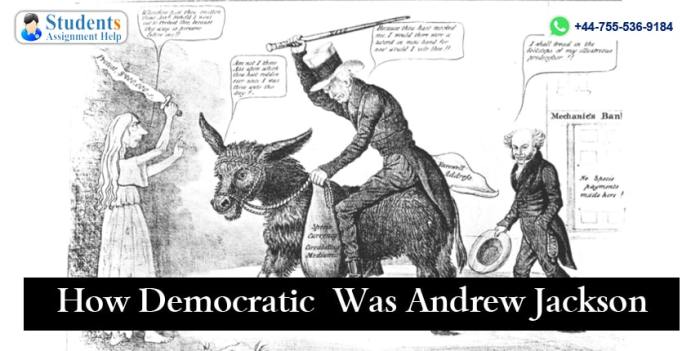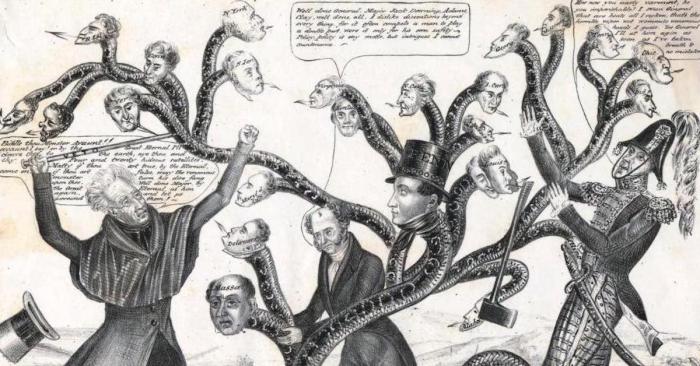How democratic was andrew jackson dbq answer key – The presidency of Andrew Jackson has been the subject of much debate among historians. Some argue that Jackson was a staunch defender of democracy, while others contend that he was a dangerous demagogue who undermined American institutions. This essay will examine the evidence for both sides of this argument and come to a conclusion about how democratic Jackson’s presidency actually was.
Jackson’s supporters point to his commitment to expanding voting rights, his opposition to the Second Bank of the United States, and his support for the common man. They argue that these policies were all designed to make American democracy more inclusive and responsive to the needs of the people.
Andrew Jackson and American Democracy

Andrew Jackson’s presidency marked a significant period in American history, characterized by both democratic advancements and challenges to democratic norms. His policies and leadership style had a profound impact on the balance of power between the federal government and the states, the rights of ordinary citizens, and the development of American democracy.
Jackson’s Policies and Their Impact on Democracy
Jackson’s policies, such as the Indian Removal Act and the spoils system, had mixed effects on the balance of power between the federal government and the states. The Indian Removal Act asserted federal authority over Native American tribes, leading to their forced relocation from their ancestral lands.
This action strengthened the federal government’s power at the expense of state and tribal sovereignty.
On the other hand, the spoils system, which involved replacing government officials with Jackson’s supporters, weakened the independence of the civil service and increased the influence of the executive branch.
Jackson’s policies also had a significant impact on the rights of ordinary citizens. The Indian Removal Act deprived Native Americans of their land and autonomy, while the spoils system favored political insiders over qualified individuals.
Jackson’s Personality and Leadership Style
Jackson’s personality traits and leadership style played a crucial role in shaping his approach to democracy. Known for his strong will and determination, Jackson often acted impulsively and without regard for constitutional constraints.
Jackson’s commitment to democratic principles was selective. While he supported popular sovereignty and the rights of the common man, he also suppressed dissent and violated the rights of minorities, including Native Americans.
Jackson’s Relationship with the People
Jackson enjoyed immense popular support, largely due to his image as a self-made man and a champion of the common people. His policies, such as the reduction of the national debt and the expansion of suffrage, appealed to the masses.
Jackson’s rhetoric and actions reflected the concerns and aspirations of ordinary Americans, particularly those in the West and South. He portrayed himself as a defender of the people against the perceived tyranny of the elite and the federal government.
Jackson’s Legacy and Impact on American Democracy
Jackson’s presidency had a lasting impact on American democracy. His policies and leadership style contributed to the rise of Jacksonian democracy, characterized by the expansion of popular participation and the strengthening of the executive branch.
Jackson’s legacy continues to be debated, with some historians praising his democratic instincts and others criticizing his authoritarian tendencies. Nevertheless, his presidency marked a turning point in American history and shaped the course of American democracy for generations to come.
Comparison to Other Democratic Leaders, How democratic was andrew jackson dbq answer key
Compared to other democratic leaders, such as Thomas Jefferson or Abraham Lincoln, Jackson’s approach to democracy was more populist and less grounded in constitutional principles.
Jefferson believed in a limited federal government and the importance of individual rights, while Lincoln prioritized national unity and the preservation of the Union. Jackson, on the other hand, emphasized the power of the people and the need for a strong executive to protect their interests.
User Queries: How Democratic Was Andrew Jackson Dbq Answer Key
Was Andrew Jackson a democrat?
Yes, Jackson was a member of the Democratic Party, which was founded in 1828. However, the Democratic Party of Jackson’s time was very different from the Democratic Party of today.
What were Jackson’s most important policies?
Jackson’s most important policies include the Indian Removal Act, the spoils system, and the Bank War. The Indian Removal Act forced Native Americans to relocate from their ancestral lands in the East to reservations in the West. The spoils system allowed Jackson to reward his political supporters with government jobs.
The Bank War was a battle between Jackson and the Second Bank of the United States, which Jackson eventually won.
What was Jackson’s legacy?
Jackson’s legacy is complex and controversial. He was a popular president who expanded democracy and promoted the common man. However, he was also a ruthless politician who violated the Constitution and forced Native Americans to relocate. Jackson’s presidency set the stage for the American Civil War.

